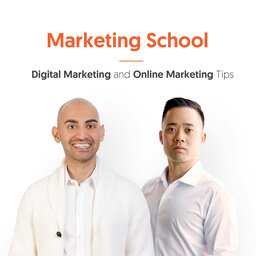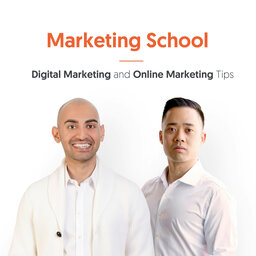How He Built A Billion Dollar Network From Scratch | Greg Isenberg
Eric Siu interviews Greg Isenberg, the CEO of Late Checkout, delving into the nuances of community building. Greg, a master in this domain, shares insights on fostering online communities for substantial growth. They explore the future of programming, the importance of design skills, and the power of social media. Greg also discusses the role of AI in entrepreneurship and the challenges of diversity and inclusion.
Watch the full interview here: https://youtu.be/kdnX63OEP5I
TIME-STAMPED SHOW NOTES:
- (00:00) Greg Isenberg has built communities of various sizes, from dozens to millions of people.
- (06:24) Greg Isenberg shares a story of paying for an expensive dinner as a teenager.
- (08:41) Greg Isenberg recounts attending a party at a co-founder of PayPal's house.
- (10:02) Greg Isenberg talks about his experience with StumbleUpon and how it led to the sale of his company.
- (12:19) Greg Isenberg discusses his interest in AI and how it relates to his innovation agency, LCA.
- (14:44) Greg Isenberg explains his approach to starting businesses as Twitter accounts or Discord communities.
- (16:49) Eric Siu and Greg Isenberg discuss the trend of influencer-led agencies and the importance of going deep into a business rather than starting new ones.
- (18:25) Greg Isenberg explains why solopreneurship may not work for everyone and the benefits of having a team.
- (20:28) Eric Siu and Greg Isenberg discuss the challenges and potential success of hiring CEOs and GMs for businesses.
- (22:23) Eric Siu and Greg Isenberg discuss the importance of experience and expertise in giving advice.
- (25:46) Eric and Greg discuss their approach to coaching and supporting the businesses they invest in.
- (27:26) Greg shares his perspective on the future of venture capital, emphasizing the value of adding more than just financing to startups.
Don’t forget to help us grow by subscribing and liking on YouTube!
Check out more of Eric’s content (Leveling UP YT) and Neil’s videos (Neil Patel YT)
TIME-STAMPED SHOW NOTES:
Leave Some Feedback:
- What should we talk about next? Please let us know in the comments below
- Did you enjoy this episode? If so, please leave a short review.
Connect with Us:
- Single Grain << Eric’s ad agency
- NP Digital << Neil’s ad agency
- X @neilpatel
- X @ericosiu
Marketing School - Digital Marketing and Online Marketing Tips
Neil Patel and Eric Siu bring you daily ACTIONABLE digital marketing lessons that they've learned th…Social links
Follow podcast
Recent clips

Mastermind Dinners: LeadGen That Actually Works in 2024
16:08

30M vs 500 Views - The One Change That Made All The Difference
12:35

AI concierge will affect dating - implications for business, Perplexity's AI-generated podcast, OpenAI dissolves team focused on long-term AI risks (less than one year after announcing it), Why swarming is killing SEO, and Ag1 spent $40m on podcasts
10:47
 Marketing School - Digital Marketing and Online Marketing Tips
Marketing School - Digital Marketing and Online Marketing Tips